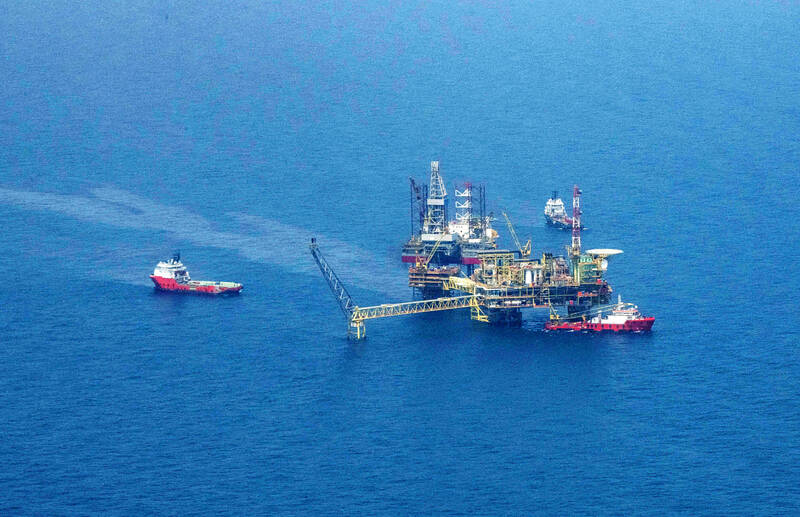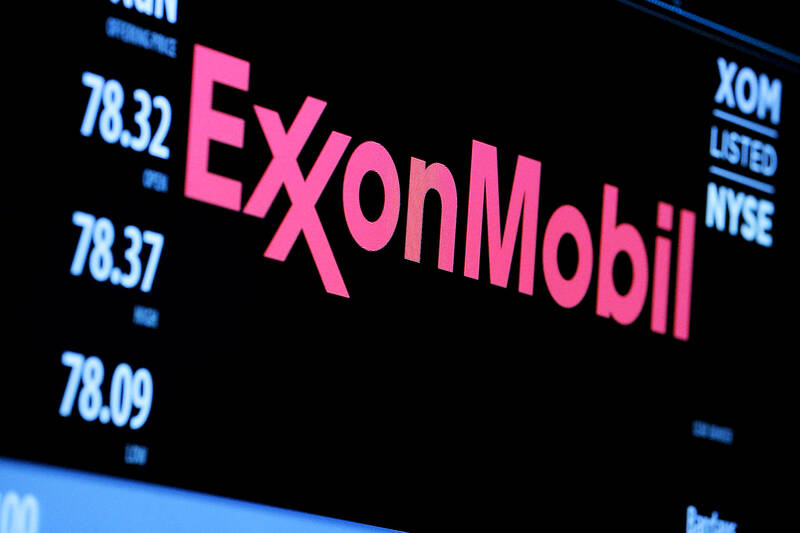Exxon Mobil Corp is planning to sell its controlling stake in Esso (Thailand) PCL, which runs a local refinery and retailing business, to rival Bangchak Corp, as the largest US oil company focuses on its home market and the production of lower-emission fuels.
Bangchak is to acquire 66 percent, or 2.28 billion shares, of Esso at a price to be determined later, the companies yesterday said in separate stock exchange filings.
It would also make a tender offer for the remaining 34 percent of the stock after securing regulatory approvals.

Photo: AFP
While the firms did not specify a value for the deal, saying it would be subject to an “adjustment mechanism” under the share purchase agreement, Exxon’s stake in Esso was valued at 23 billion baht (US$688.3 million) at its closing price on Wednesday.
Bangchak said Esso had an enterprise value of 55 billion baht, implying an indicative purchase price of 8.84 baht per share based on its third-quarter financials.
The acquisition would be fully funded by secured bank loans and cash on hand, Bangchak said, adding that the deal is expected to be completed within 12 months, subject to regulatory approvals.

Photo: REUTERS
Bangchak would also gain control of Sriracha Refinery, some distribution terminals and a network of Esso-branded retail stations in the acquisition, which would help cement its position as a leading player in Thailand’s refining and marketing industry, it said.
Bangchak is to have a combined crude oil and oil products terminals capacity of approximately 15 million barrels, which it said would enhance its reserves and energy security.
The acquisition would increase the company’s refinery capacity by 174,000 barrels per day to a total of 294,000 barrels a day, and boost the number of Bangchak’s retail gasoline stations to more than 2,100.
Exxon would continue to supply finished lubricants and chemical products in Thailand through a new company to be formed, it said in a statement.
The company’s Bangkok Global Business Center, which employs about 2,000 people, and its exploration and production activities would remain unaffected, it said.
“ExxonMobil is focusing its investments on global production facilities to meet the world’s demand for lower-emissions fuels and high-performance products, while divesting assets where others see the potential for greater value,” ExxonMobil Product Solutions president Karen McKee said in the statement.

CHIP WAR: Tariffs on Taiwanese chips would prompt companies to move their factories, but not necessarily to the US, unleashing a ‘global cross-sector tariff war’ US President Donald Trump would “shoot himself in the foot” if he follows through on his recent pledge to impose higher tariffs on Taiwanese and other foreign semiconductors entering the US, analysts said. Trump’s plans to raise tariffs on chips manufactured in Taiwan to as high as 100 percent would backfire, macroeconomist Henry Wu (吳嘉隆) said. He would “shoot himself in the foot,” Wu said on Saturday, as such economic measures would lead Taiwanese chip suppliers to pass on additional costs to their US clients and consumers, and ultimately cause another wave of inflation. Trump has claimed that Taiwan took up to

A start-up in Mexico is trying to help get a handle on one coastal city’s plastic waste problem by converting it into gasoline, diesel and other fuels. With less than 10 percent of the world’s plastics being recycled, Petgas’ idea is that rather than letting discarded plastic become waste, it can become productive again as fuel. Petgas developed a machine in the port city of Boca del Rio that uses pyrolysis, a thermodynamic process that heats plastics in the absence of oxygen, breaking it down to produce gasoline, diesel, kerosene, paraffin and coke. Petgas chief technology officer Carlos Parraguirre Diaz said that in

SUPPORT: The government said it would help firms deal with supply disruptions, after Trump signed orders imposing tariffs of 25 percent on imports from Canada and Mexico The government pledged to help companies with operations in Mexico, such as iPhone assembler Hon Hai Precision Industry Co (鴻海精密), also known as Foxconn Technology Group (富士康科技集團), shift production lines and investment if needed to deal with higher US tariffs. The Ministry of Economic Affairs yesterday announced measures to help local firms cope with the US tariff increases on Canada, Mexico, China and other potential areas. The ministry said that it would establish an investment and trade service center in the US to help Taiwanese firms assess the investment environment in different US states, plan supply chain relocation strategies and

Japan intends to closely monitor the impact on its currency of US President Donald Trump’s new tariffs and is worried about the international fallout from the trade imposts, Japanese Minister of Finance Katsunobu Kato said. “We need to carefully see how the exchange rate and other factors will be affected and what form US monetary policy will take in the future,” Kato said yesterday in an interview with Fuji Television. Japan is very concerned about how the tariffs might impact the global economy, he added. Kato spoke as nations and firms brace for potential repercussions after Trump unleashed the first salvo of